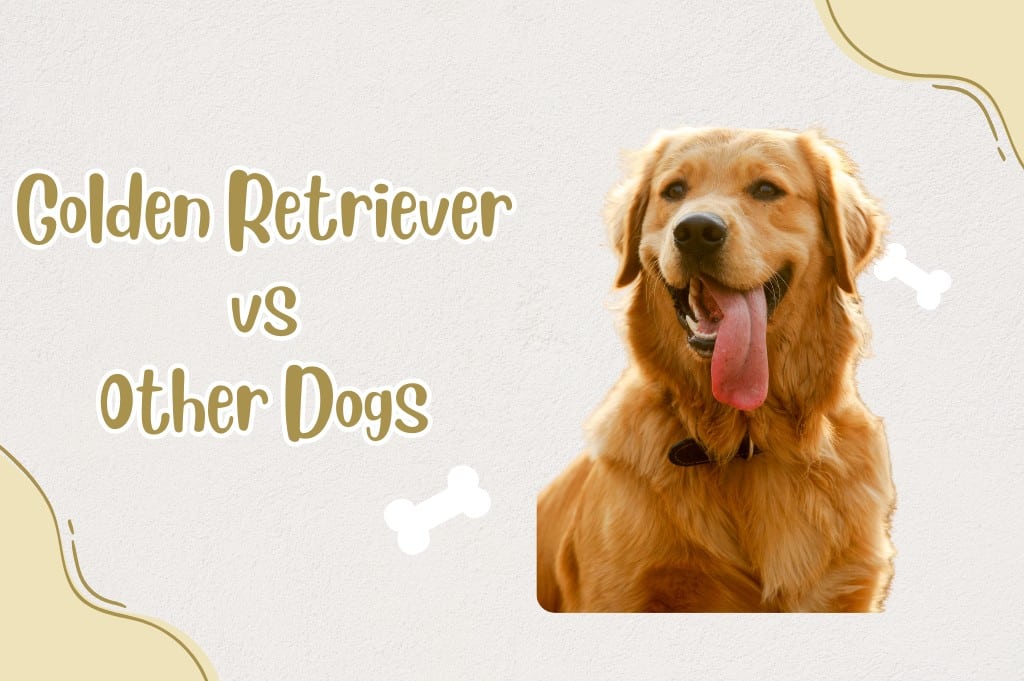Dogs are adorable, and having a dog as a pet is remarkable. There are different types of dogs, and they vary in breed and kind. Not all pet owners are aware of the variety that comes with dogs.
However, a veterinarian needs to have a firm grip on this as they are the people who encounter different dog breeds while caring for their pet patients.
Golden retrievers are a vital breed and are furrier than any other type of dog. Their external fur layer makes them unique and different from other dogs. Veterinarians might find it interesting that not only single but this Scottish breed of retriever comes with a double coat of fur. The average size they turn into is medium.

This article will discuss specific facts and guiding points for veterinarians to understand their furrier patients better.
| Category | Golden Retrievers | Other Dogs |
| Origin | Originated in Scotland, bred for retrieving game during hunting. | Various origins depending on breed, bred for specific tasks such as guarding, herding, or companionship. |
| Physical Features | Medium-sized, muscular build with a broad head and wide nose; double-layered fur for weather resistance. | Physical features vary widely—e.g., Greyhounds are slender, Bulldogs have compact frames, and Huskies have thick coats. |
| Life Expectancy | 10–12 years, with potential to live up to 13 years with good care. | Smaller breeds like Chihuahuas often live 12–16 years, while larger breeds like Great Danes may live 8–10 years. |
| Common Health Issues | Susceptible to cancer (higher ratio), hip dysplasia, and joint problems; prone to allergies and hearing loss after 10 years. | Health issues vary: Dachshunds face back problems; Pugs have breathing issues; larger breeds are prone to heart diseases. |
| Temperament | Gentle, intelligent, affectionate; easy to train and handle, making them ideal for families and therapy roles. | Temperament ranges from the independent and aloof Shiba Inu to the protective and loyal German Shepherd. |
| Roles in Society | Therapy dogs, guide dogs for visually impaired individuals, companions in dog shows, and obedience trials. | Roles vary: Guard dogs (Dobermans), police/military dogs (Belgian Malinois), lap dogs (Pomeranians), etc. |
| Exercise Needs | High energy; require daily exercise, such as walks, runs, or play sessions to stay healthy and mentally stimulated. | Exercise requirements differ—e.g., Greyhounds need sprints, while Bulldogs prefer moderate, low-impact activities. |
Distinct Appearances
The first thing is first. Veterinarians can quickly identify golden retrievers based on their distinct appearances. They differ from the common dogs in their appearance. As mentioned above, it has a muscular build and comes in medium sizes majorly. They have a broad head on their body with a wide nose and pigmented drooping flies.
All these features make them different from regular dogs. The double layer of the fur is one striking feature that differentiates it from others. Where the inner layers help resist the weather, the external layer is primarily long.
Common Health Issues in Golden Retrievers
Dealing with golden retriever behavior can be challenging for a veterinarian. However, the good thing is that these retrievers have a gentle nature. They are also intelligent and affectionate. They cooperate during procedures and treatments as they are calm and easy to tame. They often put great effort into making their owner happy, and this also favors the veterinarian, who can handle them skillfully while understanding the breed right away.
Dog breed characteristics differ on many grounds. While many dogs are vulnerable and fragile, a golden retriever can resist and stay active because it has a strong protective layer in the form of fur. However, viruses and diseases can hit any dog.
Additionally, many other health issues are common, particularly in this breed, which a veterinarian must know as they often have to opt for veterinary surgeries. If they come across a golden retriever patient with a little dislocated femoral head, they should be able to note the difference immediately.
A certain genetic disease makes larger breeds of dogs, including retrievers, suffer from this disease. Another essential factor that makes them different is, unfortunately, a higher ratio of developing cancer compared to other breeds. They also get to catch the allergies differently.
Golden Retriever Veterinary Care
Suitable and adequate veterinary care needs to be put into practice for this species of dog as they are different from other dogs. Veterinarians naturally get that they must follow specific medical guidelines to ensure their furry patients live healthier lives. Pet owners share that they have found arthritics and joint problems among the common health issues in golden retrievers.
Most veterinarians also understand retrievers and consider them one factor that makes them unique in their community. Many owners also shared that loss of hearing, night vision, and joint problems mainly start after age 10, leading to veterinary surgeries. Hence, retrievers need good veterinary care from the very start.
Multiple and Different Uses of Golden Retrievers
Golden Retrievers are versatile and cherished for their many roles in society. Here’s how they shine in different areas:
Perfect Companions for Dog Shows
Golden Retrievers are a popular choice for dog shows because of their friendly nature and intelligence. Dog shows promote their health and happiness while giving owners a chance to celebrate their furry friends.
These events also help veterinarians understand the specific needs of show dogs, ensuring better care during their fragile times.
Obedience Trials
Golden Retrievers excel in obedience trials due to their eagerness to learn and follow commands.
These trials showcase their intelligence and trainability.
Therapy and Guide Dogs
Golden Retrievers are widely used as therapy dogs, bringing comfort to people in hospitals and care homes. They also serve as guide dogs, assisting individuals with visual impairments and making everyday tasks more manageable.
Golden Retrievers truly are a breed that stands out for their adaptability and willingness to help in so many ways!
A lovely version of golden retriever: English Cream Golden Retriever
Life Expectancy

A veterinarian needs to note that the golden retriever’s life expectancy remains between 10 and 12 years. This is similar to all big breeds. However, the smaller ones are more vulnerable, such as small Pomeranians, which barely live up to 4 and a half years. Most diseases attack this dog breed after 10. They can also live up to 13 years.
You may like: Tips to Increase Lifespan of a Golden Retriever
Good veterinary care can undoubtedly increase the life expectancy of golden retrievers, so veterinarians should have the relevant knowledge and awareness to handle and differentiate this specific race of dogs from ordinary dogs.
Golden Retriever Care Tips
Last but not least, veterinarians should be able to understand the psyche and behavior of golden retrievers while knowing the canine health differences. A few care tips they advise to the owners of their animal patients can make a real difference in the quality of life of a golden retriever. They should be brought to clinics for regular checkups.
The veterinarian should also register for conferences and webinars. With the year ending, they can look for new veterinary conferences 2025 to keep themselves updated.
Moreover, veterinarians should make arrangements to remind their pet owners to visit clinics on time. The vaccine shots should be according to the schedules. Dental and ear care matters a lot. They should be engaged in proper exercise along with a balanced diet.
Related Post: Veterinary Supplies that Your Golden Retriever Needs
In Short
Golden retrievers are a fine breed of dog originating from Scotland. A veterinarian needs to understand the habits of his animal patients. They can start by spotting the differences among golden retrievers and other dogs. This may include distinct appearances, common health issues, knowing their life expectancy, and suggesting certain tips to pet owners.
If you, as a veterinarian, have difficulty knowing golden retrievers and other dogs and understanding their differences, you can always reach out to vet and tech for free education resources. This platform offers free-of-cost educational materials and webinars. Not only this, but you can also easily get free RACE-approved CE credits by attending our free webinars.




[…] Related Post: Golden Retriever vs Other Dog Differences […]